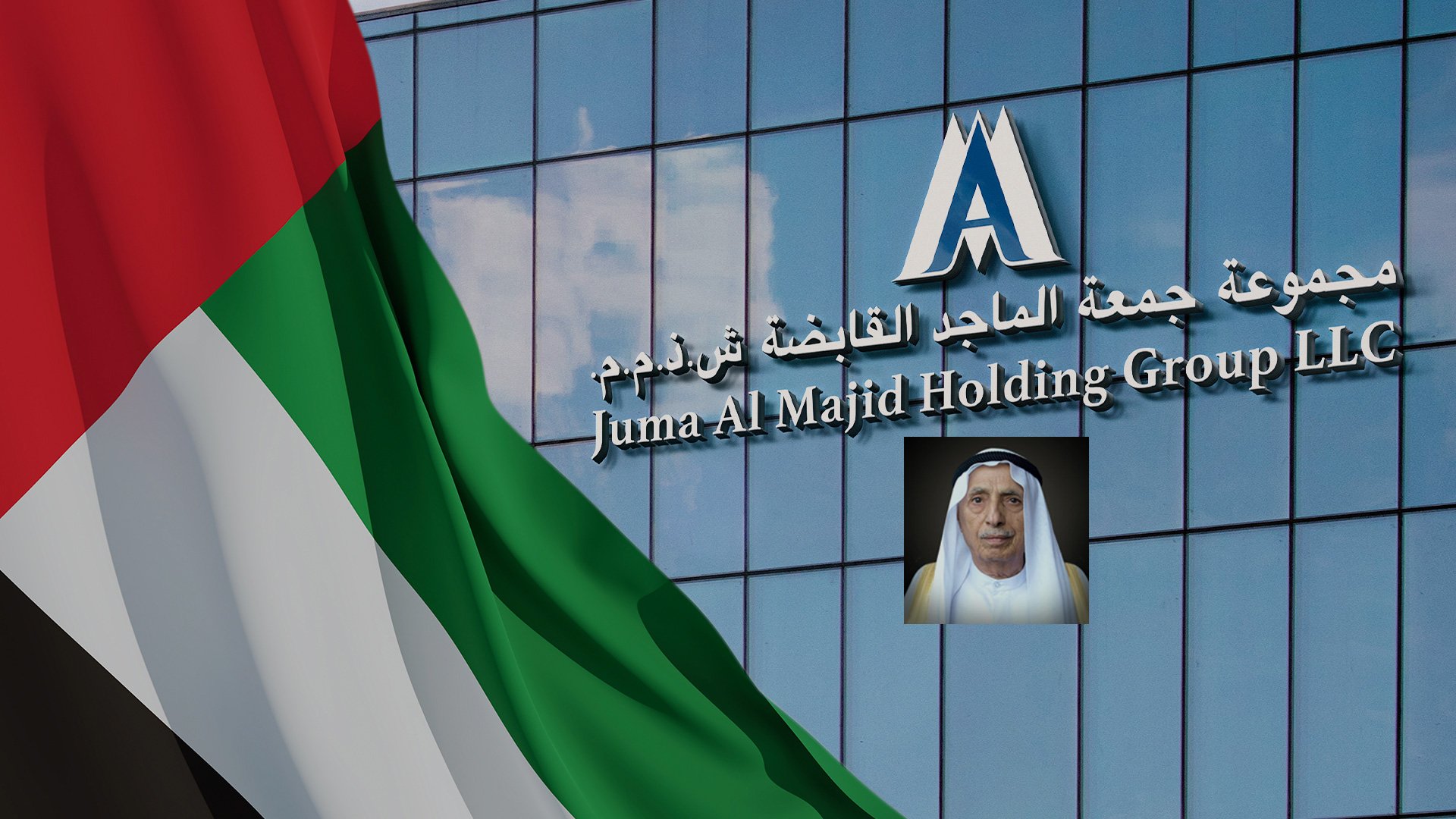Juma Al Majid is a legendary Dubai businessman and philanthropist known for building one of the UAE’s largest private conglomerates and for tireless cultural and educational work. He founded the Juma Al Majid Holding Group, now spanning dozens of companies across trading, manufacturing, real estate and more, and has held key public posts (chairman of the Dubai Economic Council, vice chair of the UAE Central Bank, etc.). Throughout his life he has emphasized giving back: funding schools and colleges, supporting scholarship, and preserving Arab Islamic heritage.
Early Life and Beginnings
1930: Born in Al Shindagha (historic Dubai), son of a pearl diving captain. He learned Quran, Arabic and reading in local “kuttab” schools.
Childhood: At about age 8, he joined his father on pearl diving boats, serving refreshments for a few rupees. These harsh years taught him patience and work ethic.
Teen Years: At 15, his uncle Ahmad Al Ghurair hired him in a shop selling fabrics, rice and other goods. Recognizing Juma’s talent, Al Ghurair soon opened a small shop for him to manage. By 17 Juma Al Majid was running his own textiles business with just 700 rupees in startup capital, approximately 56 dirhams at the time, according to Gulf News.
Building a Business Empire
From a small shop, Juma Al Majid built a business empire that began with the founding of the Juma Al Majid Holding Group in 1950. By 1958 he had secured the UAE’s exclusive rights for Yokohama tires, and in the late 1960s he partnered with General Electric, making his company the Gulf’s second largest GE distributor by the 1970s. He expanded into consumer goods with Gulf Trading & Distributing (1962), construction through GENAVCO (1967), and real estate projects such as the Al Majid Tower. His reach widened further with Al Majid Motors in 1988, bringing Kia cars to the UAE, while also acquiring franchises for Hyundai, Samsung, and Hitachi. Today, the group encompasses over 30 companies and thousands of employees across sectors from contracting and hospitality to trading and investment.
Education and Philanthropy
Even as his businesses flourished, Al Majid invested heavily in education and charity. In the early 1950s, alongside Humaid Al Tayer, Abdullah Al Ghurair and others, he helped establish Dubai’s first charitable society, which built the Jamal Abdul Nasser Secondary School for boys and the Amna Secondary School for girls.
In 1983 he founded the National Charity Schools for underprivileged expatriate children, offering free Arabic and English education to thousands from diverse nationalities. Four years later, in 1987, he established the Islamic and Arabic Studies College in Dubai, accredited by Al Azhar University and the UAE Ministry of Education. The college, free of charge and open to GCC students, has seen over 3,300 women graduate, underscoring his commitment to female education.
In 1990 he co-founded the Beit Al Khair Society, supporting needy Emirati families, students, and disaster victims, while also prioritizing Palestinian students and funding schools across the Arab and Muslim world.
A year later, in 1991, he launched a public library that became the Juma Al Majid Centre for Culture and Heritage, now a leading institution in preserving Arab manuscripts. The centre donated 28,553 books to Palestinian universities in 2018 under the UAE’s “Reading Nation” campaign.
Despite never completing formal schooling, Al Majid often emphasized that “knowledge should be free.” His initiatives, from grassroots schools to world class cultural preservation, earned him a seat on Harvard University’s advisory committee for Middle Eastern Studies, and left a lasting mark on literacy and scholarship across the UAE and beyond.
Preserving Heritage and Culture
Al Majid is widely celebrated as a patron of Arab and Islamic culture. In 1991 he turned his private library into the Juma Al Majid Centre for Culture and Heritage in Dubai. This center houses one of the world’s largest private collections of Arabic manuscripts, books and historical documents. The center supports researchers and publishes works on Gulf history. It has become a landmark institution for preserving knowledge.
Under his leadership, the center also became famous for restoring fragile manuscripts. Al Majid funded the development of special restoration equipment (branded “Al Majid” machines) to repair old books and papers. He donated these machines, along with thousands of rare books, to libraries and museums worldwide. For instance, his team signed an agreement with Egypt’s Library of Alexandria in 2019, supplying restoration machinery, training, and paper paste materials to rebuild the library’s collection. In total his center has sent restoration machines to over 20 countries.
Remarkably, the Juma Al Majid Centre offers many services free of charge. It binds and restores over 2,000 books and manuscripts every month, and provides microfilm copies of rare texts to students and scholars around the world at nominal cost. Al Majid believes “books represent human heritage” and feels a duty to save them. His centre’s outreach programs help ensure that Arabic and Islamic literary heritage is preserved for future generations.
Impact and Recognition
Juma Al Majid’s life story, from a pearl diver’s boy to a billionaire entrepreneur, is often told as an example of Dubai’s own rise. He has been dubbed a “legendary” figure who turned adversity into success. His multifaceted contributions have drawn many honors. In 2019 he was named “Islamic Personality of the Year” by the Dubai International Holy Quran Award for his service to Islam and charity. In 1999 he received Saudi Arabia’s prestigious King Faisal International Prize for Service to Islam. Other honors include the Sultan Al Owais Cultural Award (1992) and the UAE’s highest cultural prize, the Medal of Culture and Creativity (2024).
Locally, he was recognized as one of the UAE’s “pioneers” by Sheikh Mohammed bin Rashid Al Maktoum (2015). Across the Middle East, scholars credit him with preserving national identity through education and archives. Even in old age he remains active: he still chairs the Al Majid Group and the cultural centre, and mentors young leaders. His emphasis on learning, generosity and cultural pride continues to inspire many.
While Juma Al Majid’s business empire is vast, his personal net worth has not been publicly disclosed in any authoritative source such as Forbes, which lists his conglomerate among the region’s leading family groups without publishing a specific figure.
Juma Al Majid’s legacy is thus threefold: he built businesses that helped modernize Dubai’s economy, he uplifted the community through education and charity, and he safeguarded Arab heritage for posterity. In doing so, he helped shape the UAE’s development in business, social progress and culture, making him one of the most important figures in Dubai’s modern history.







Leave a Reply